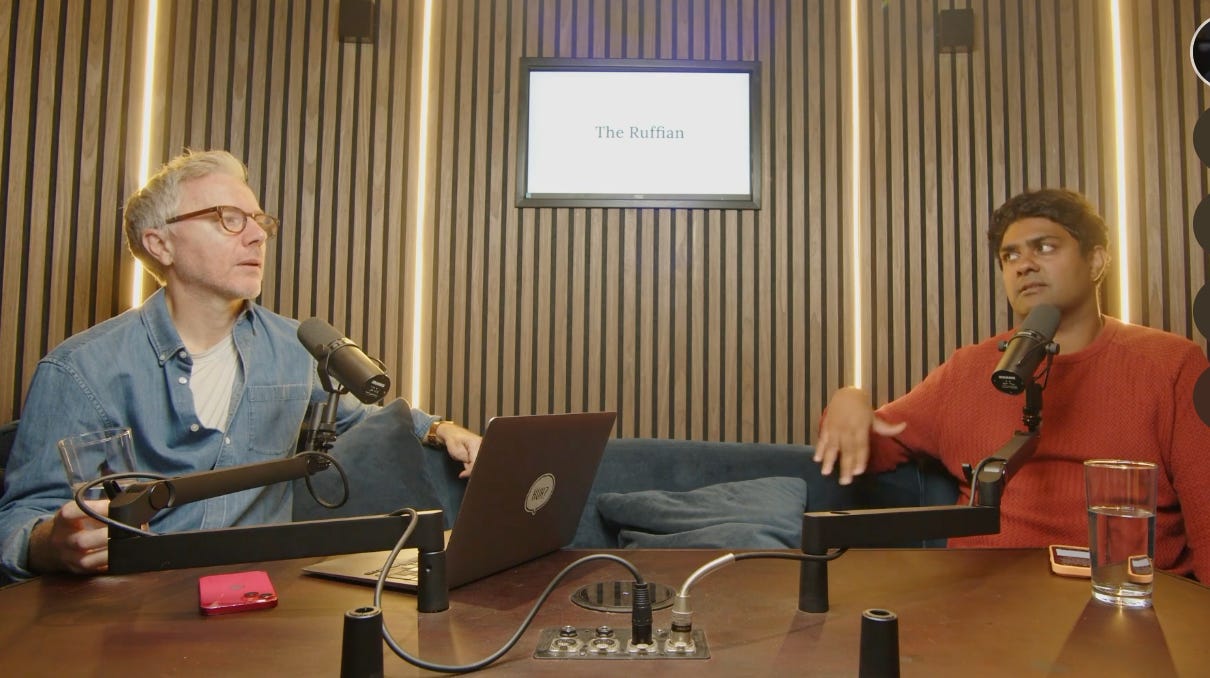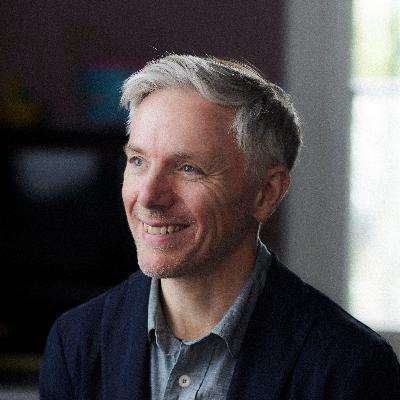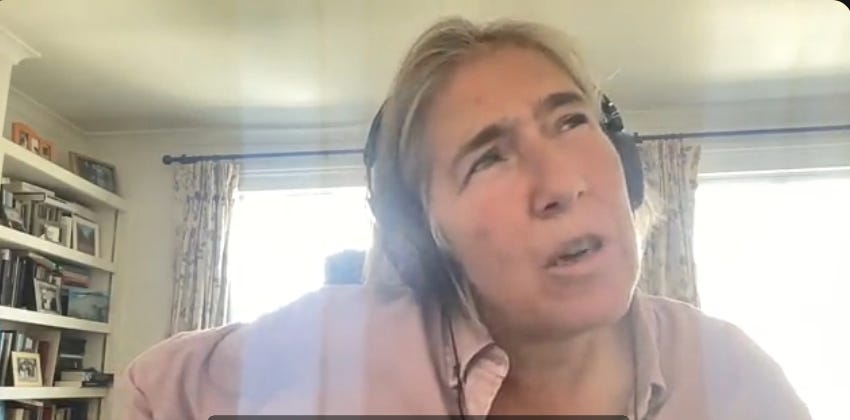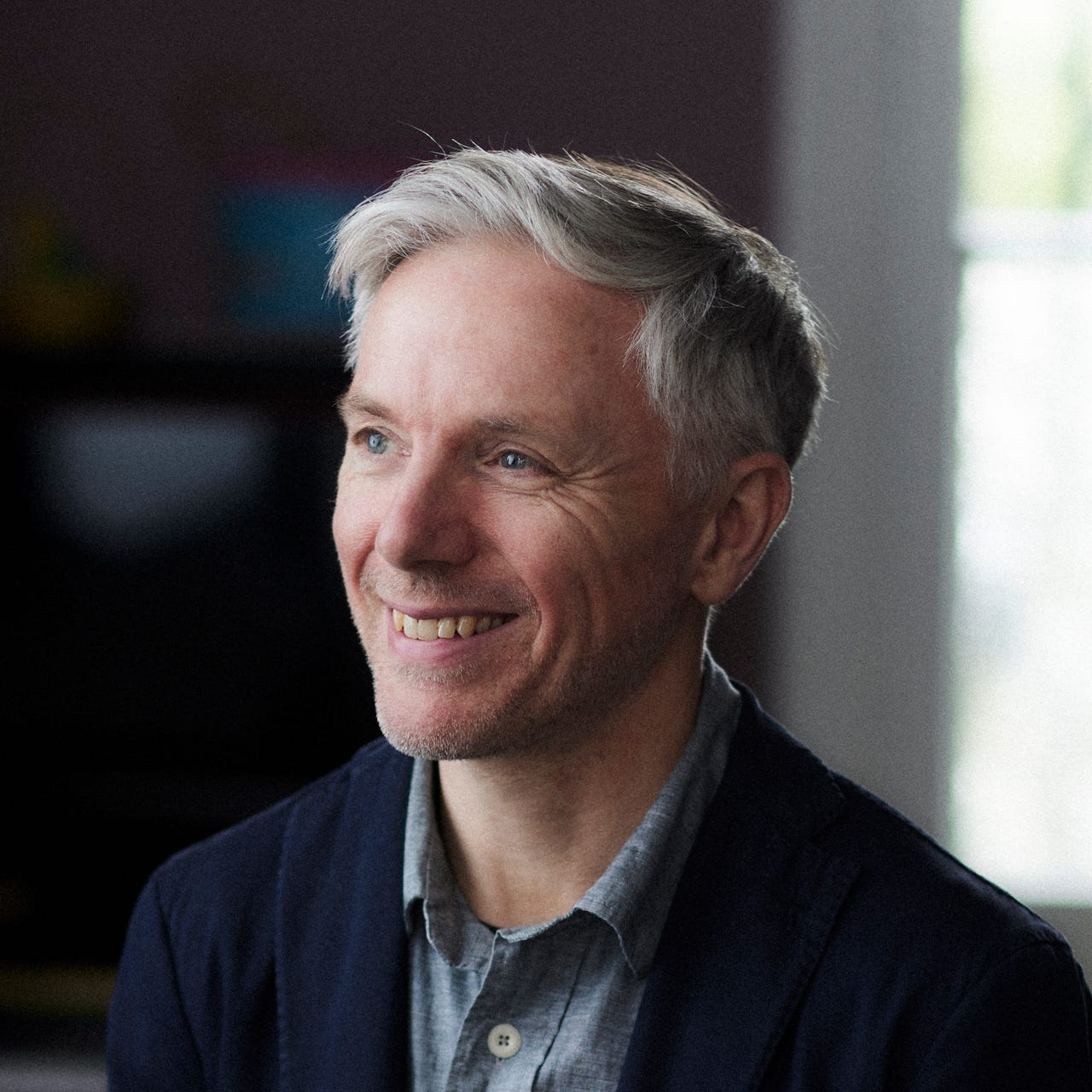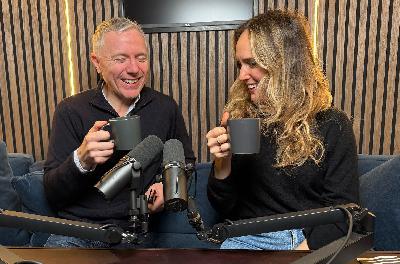Discover The Ruffian
The Ruffian

The Ruffian
Author: Ian Leslie
Subscribed: 16Played: 194Subscribe
Share
© Ian Leslie
Description
13 Episodes
Reverse
In this episode of The Ruffian’s podcast we ask whether the price of using increasingly smart machines is increasingly stupid humans. My guest is Daisy Christodoulou, director of education at No More Marking, and my favourite thinker on learning and education.Daisy recently wrote a Substack post asking whether we live in a ‘stupidogenic society’ - just as it’s said that we live in an ‘obesogenic environment’ - one that tends to cause stupidity. She argues that our use of technology to substitute for cognitive skills has got to the point where human intelligence is in decline, a claim she supports with evidence. Daisy is no Luddite. She works for an edtech company. She acknowledges that modern technologies are incredibly useful, indeed indispensable. But she’s interested in the trade-offs we’re making between utility and intelligence, and in what the optimal point might be. She also gives her view on how schools should adapt to this environment.I hope you enjoy our excellent, somewhat intelligent conversation, which is available on all the usual podcast platforms. This is a public episode. If you'd like to discuss this with other subscribers or get access to bonus episodes, visit www.ian-leslie.com/subscribe
Britain is in a depression. Not an economic one - we're still growing, albeit slowly - but a cultural and political one. We are running low on optimism, self-esteem and, most dangerously, on hope - on the sense that we can fix things.Voters have become deeply cynical about the political class; support for both main parties has collapsed. They’re turning to Reform, not necessarily because they believe Nigel Farage will fix anything, but because he captures the almost nihilistic mood. How can Britain get out of this moment? To put it another way, how can it get happy again? Broadly speaking, there are two paths out of here, which in reality have to be travelled at the same time. The first is economic growth. But higher growth won't come unless we make progress down a second path - a cultural and psychological one. We need people to believe that they can improve things - improve their lives, their communities, their country. One way of putting this is that we need a more “high agency” culture. That's what I'm going to discuss with returning guest James Kanagasooriam, chief research officer at FocalData. James is a pollster, and one of the most brilliant political and cultural analysts around. He’s just completed a major research project on agency among British voters. Agency is a concept that’s become popular in Silicon Valley (James credits Cate Hall, the poker player, businesswoman and writer, for shaping his thinking on it). It’s essentially about believing you can make things happen. James has created a way to measure it at scale, and the results are fascinating. This is a public episode. If you'd like to discuss this with other subscribers or get access to bonus episodes, visit www.ian-leslie.com/subscribe
A few weeks ago I posted an extract from a brilliant book called A Brief History Of Intelligence, by Max Bennett. It proved really popular with Ruffian readers, so I’m delighted to have Max on the podcast to discuss some of the questions his book raises.In Part One, which is free for everyone, and on all the usual podcast platforms, I ask Max about the concept of 'reinforcement learning' and what makes it so important to both human and machine intelligence. We talk about the differences between how AIs learn and how humans learn. We also get into the evolution of imagination - the human ability to simulate different worlds and different futures. (It's all fascinating but I strongly recommend checking out that part of the discussion in particular.)In Part Two, which will land in a few days for paid subscribers only, I ask Max about something he doesn't get into in the book - the future of AI. How does his deep understanding of human intelligence inform his thinking about where we're headed?Enjoy! This is a public episode. If you'd like to discuss this with other subscribers or get access to bonus episodes, visit www.ian-leslie.com/subscribe
There is a growing sense that Britain's fiscal position is unsustainable. We’re spending more than we’re raising in tax, our debt is growing faster than the economy, and bond market scepticism about the government’s ability to fix any of this is driving up our interest payments.We may be heading for a crisis that will make Liz Truss’s mini-budget debacle look like a minor wobble. It would cause a lot of economic harm. It could also force us to rethink our priorities, as happened in the wake of the IMF bailout crisis in 1976. In order to think about what a crisis would look like and what its effects might be, I invited Helen Thompson on to the podcast.Helen is professor of political economy at Cambridge University. She is an expert on political and economic history, with a specialism in the geopolitics of energy production. Helen will be well known to many of you from her podcasting and journalism. In recent years she's become a widely influential thinker and writer beyond the academy, renowned for the depth and seriousness of her analysis. I can't think of a better person to ask about Britain's next crisis.This episode is a two-parter. In part one, which is free for all (Search ‘The Ruffian’ on all the usual podcast platforms), Helen talks about the forces pushing us towards crisis point, why she thinks the reckoning could come very soon, and why the current government's attempts to head it off are doomed to fail. We discuss whether and how a crisis might lead to a reset of our political priorities, with reference to past crises. In part two, which will be for paid subscribers only, we talk about what a crisis would mean for our Net Zero target. We also ask whether Nigel Farage's Reform has peaked too early. While it’s not very cheery, I found this a fascinating and eye-opening conversation. I hope you will too. This is a public episode. If you'd like to discuss this with other subscribers or get access to bonus episodes, visit www.ian-leslie.com/subscribe
Are our new AI overlords tools intelligent in the same way humans are? Is an AI agent truly, well agentic? Does it have a mind of its own, so to speak? Might it just decide to destroy us? Or is this completely the wrong way to think about it?In this episode I get into these questions with Professor Alison Gopnik, professor of psychology and affiliate professor of philosophy at UC Berkeley, where she's also a member of the AI Research Group.As many of you will know, Alison is a brilliant and profound thinker on cognition, innovation, and learning. She bridges the worlds of developmental psychology, philosophy, and technology. Her superb books on the science of childhood learning were a big influence on my own book about curiosity..I invited Alison on to discuss a recent paper she co-authored which argues that AI is not an ‘agent’ but a ‘cultural technology’ like the library or the printing press - just the latest in our long history of finding new ways to organise and transmit human information at scale. We discuss that and much else besides. This was so much fun to record. Alison gives us a scintillating and witty tour of her thinking about thinking; human and machine. This is a public episode. If you'd like to discuss this with other subscribers or get access to bonus episodes, visit www.ian-leslie.com/subscribe
I recently talked to James Marriott about the future of writing and journalism in the age of AI. James was quite worried about how good the chatbots have got at writing and wondered if it spells doom for human writers, especially journalists. So I thought it would be good to follow up with a conversation with Jasmine Sun, a very talented young tech journalist and thinker from San Francisco. Jasmine writes for publications including the Wall Street Journal and the San Francisco Standard. She has a Substack - read her notes on AI and writing here - and is collaborating with the NYT’s chief tech columnist Kevin Roose on a book about the race to AGI.Jasmine worked in tech - for Substack, actually - before taking the leap into freelance journalism. It’s a slightly counter-intuitive career move and one I was keen to hear more about. Jasmine explains why she has faith in the future of journalism and human writing. We get into what LLMs can and can’t do; the human skills they can replicate, and those they can’t; why automation is often harder than people in tech think; whether there will be successful AI influencers; why people still seek a human connection; the importance of struggle in creativity. (At one point I mention Will Storr’s AI experiment - see here). As you can tell, while the conversation is centred on writing it’s about more than that.Jasmine was a brilliant guest, bubbling with insight and ideas, and great company. Since she was in London for a few days so we took the chance to record our chat in person. We used Westminster Podcast Studio, a small but perfectly formed studio in Kennington which I recommend. The audio pod is on all the usual platforms, and the video version is below. This is Part 1. In Part 2, for paid subscribers, we get into the nitty-gritty of how to get the most out of LLMs, Jasmine has some excellent tips on that. That’s coming soon.Enjoy! This is a public episode. If you'd like to discuss this with other subscribers or get access to bonus episodes, visit www.ian-leslie.com/subscribe
ChatGPT and Claude have got really quite good at writing. As they improve, will they make human writers, even highly skilled ones, as obsolete as typists? In the first part of this two-part episode, I discuss that question with returning guest James Marriott. James has been posting some of his experiments with ChatGPT his Substack and on Twitter - like this one:This stirred up quite a storm. It’s a topic that generates strong emotions - particularly among writers, as you might expect! It also opens up the question of what good writing is, and what kinds of writing we value most. We start with literature and move on to journalism and writing generally. I found our conversation fascinating and I hope you will too. If you’d like to watch us have it, here’s the video:In Part II, coming soon, for paid subscribers only, we’ll discuss the other side of this equation - reading. This is a public episode. If you'd like to discuss this with other subscribers or get access to bonus episodes, visit www.ian-leslie.com/subscribe
In this episode of The Ruffian’s podcast we discuss what is possibly the single most important event in human history: the Industrial Revolution. If you look at all the economic data before (very roughly) 1780-1840, you see flat lines. Afterwards, everything starts going up, and continually. It's not just GDP - human welfare is transformed. Human became much more numerous and at the same time much richer, longer lived, and healthier.The Industrial Revolution wasn't just about coal and steel and factories. More fundamentally, it was the moment we learned how to continually get more value out of the same or fewer resources. The discovery of productivity growth transformed the human condition.But there are big unsolved questions about the origins of this transformation. Why did it happen at that time and not earlier? Even more puzzlingly, why did it happen first in Britain, and not, say, France, or the Netherlands, or China? Historians have debated these questions for decades. Some point to material factors like the price of labour and natural resources; others think that culture was more important. My guest leans toward the latter explanation, although as you’ll see, he has his own particular take on it.Anton Howes is an historian of innovation who is currently writing a book on the Industrial Revolution's origins based on his deep research into the leading inventors and entrepreneurs of the era. He has a popular Substack called The Age of Invention in which he shares some of the amazing stories he has uncovered. I’m delighted to have him on the show.This is part one of our conversation, in which we discuss Anton’s idea of “the improving mentality”, the mindset that he sees as underpinning the Industrial Revolution, and why it became widespread in Britain first of all. In part two, for paid subscribers only, we discuss why most of the action took place in the north of England rather than in London.Enjoy! This is a public episode. If you'd like to discuss this with other subscribers or get access to bonus episodes, visit www.ian-leslie.com/subscribe
I’m delighted to share with you a new conversation with returning guest, The Times columnist James Marriott. Those of you read James’ recent column about the mediocrities who rise to the top of our institutions will know that he has strong views on our elites. This conversation was recorded a while back, so we don’t discuss that column, but we do talk about a new book called Born To Rule: The Making and Remaking of British Elites, by the sociologists Sam Friedman and Aaron Reeves. James and I both really enjoyed the book and we were stimulated in particular by its discussion of the changing ways that elites have used culture to signal their status. I hope you enjoy our conversation. This is a public episode. If you'd like to discuss this with other subscribers or get access to bonus episodes, visit www.ian-leslie.com/subscribe
Note: if you’re in the UK, pick up a copy of today’s Sunday Times. The magazine is running an extract from the first chapter of John & Paul. You can also read it online FOR FREE if you click today (Sunday). (The Times website has taken its entire paywall down for the weekend, not just in my honour I hasten to add.) And don’t forget to pre-order!I’m delighted to share with you this conversation with Nabeel Qureshi, a software engineer, entrepreneur, and writer. It’s all about his principles for living, which he laid out in a recent blog post.Nabeel grew up in England. He studied PPE at Oxford where he specialised in philosophy, particularly Wittgenstein and Parfit. In his twenties he founded a fintech company, worked for Palantir, lived in San Francisco, and France. He's been a visiting scholar in AI and economics at the Mercatus Center in Virginia. He’s currently running a startup based in New York.Nabeel has not only done a lot, he has one of the widest intellectual ranges of anyone I know, able to talk fluently and knowledgeably on machine learning and bioscience and finance and also on literature, music, film and art. He does all this without a hint of showing off or pretension. He's just a deeply curious guy who has read and watched and processed an incredible amount of good stuff, and has interesting things to say about all of it.He recently posted a list of 63 principles for living, from the philosophical to the practical. It's proven very popular online. When I linked to it from the Ruffian, many of you said how much you enjoyed it. So I thought I'd invite Nabeel on the podcast to talk through some of his principles. The result is a fascinating conversation that covers everything from how to make the most of your talents, to how to think more clearly, to the best way to take notes.I strongly recommend checking this out; if nothing else it will get you thinking about some pretty important questions. In fact we had so much to talk about that this episode is in two parts. The second, coming soon, will be available to paid subscribers only. This is a public episode. If you'd like to discuss this with other subscribers or get access to bonus episodes, visit www.ian-leslie.com/subscribe
Jemima Kelly is a columnist and reporter for the Financial Times and one of the most original and interesting voices in the British press. She writes about culture and economics and politics and always comes at them from unexpected angles, usually with a dose of humour. As a reporter she likes to dive into worlds very different from her own, and in late 2022 she took a trip to a very strange world indeed: Palm Beach in Florida, island of billionaires, and home to Mar-a-Lago, the court of Donald Trump. She got herself invited to Mar-a-Lago, where she met Trump and observed him up close in his natural habitat. She wrote a brilliant account of that adventure for the FT magazine and followed it up with a second in early 2024.I recommend reading both. But when I heard Jemima talking about her experience recently, I knew I wanted her on the podcast, because as well as being a great writer she's a natural raconteur, and has plenty to say that didn't make it on to the page.What follows is a vivid, funny, and often surprising impression of what Trump is like in person. Jemima also gives a highly perceptive analysis of how his weird brand of personal charisma connects to his political success. I would say this, but I truly think this is one of the best analyses of Trump’s personality and appeal you’re likely to come across.This conversation is in two parts. After Jemima and I talked about Trump at Mar-a-Lago, we recorded a bonus episode which starts off about being about Trump's marriage to Melania and veers off into a discussion of his love of music, before culminating in a grand theory of American presidential politics.This first episode is free for everyone. The second is only for paid subscribers. I'll be releasing it shortly. This is a public episode. If you'd like to discuss this with other subscribers or get access to bonus episodes, visit www.ian-leslie.com/subscribe
James Kanagasooriam on 'culturenomics' https://www.thetimes.com/article/culturenomics-will-define-new-political-era-fqvx0nvb3 This is a public episode. If you'd like to discuss this with other subscribers or get access to bonus episodes, visit www.ian-leslie.com/subscribe
The Ruffian newsletter now has a podcast! In this inaugural episode, Ian Leslie and James Marriott discuss the phenomenon of Jordan Peterson, the most influential thinker of the last ten years. This episode was produced by Jack Aldane. This is a public episode. If you'd like to discuss this with other subscribers or get access to bonus episodes, visit www.ian-leslie.com/subscribe



